12 scholarly books by Saint Paul Seminary Press
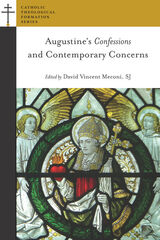
Augustine's Confessions and Contemporary Concerns
David Vincent Meconi, SJ
Saint Paul Seminary Press, 2022

Everyone's Apocalypse
A Reflection Guide, 2nd Edition
Donal A. McIlraith
Saint Paul Seminary Press, 2024
Everyone’s Apocalypse attempts to respond to the request of Dei Verbum 22 that “Easy access to Sacred Scripture should be provided for all the faithful.” In this easy-to-read introduction for beginners, modern scholarship and the Church’s tradition meet to help readers understand and pray through this demanding part of God’s Word.
Following Ugo Vanni’s proved structure, the two parts of the Apocalypse (chapters 1–3 and 4–22) are presented in seven chapters. The opening two chapters show John’s vision of the Risen Jesus as Son of Man and his words to the seven churches of Asia Minor. Chapter three presents the vital section, full of worship, of the throne vision of God as creator and of Jesus, slaughtered and risen, as redeemer. The opening of the seven seals by the Lamb, the four horsemen, the Risen Jesus, the destruction wrought by the seven trumpets, the three signs of the Woman, the Dragon, and the seven angels with the seven bowls of wrath are dealt with in the next three chapters. The final chapter outlines the climax of the book. Harlot Babylon, the evil city, is judged and falls and, following the intervention of the bridegroom Lamb and the removal of God’s enemies, the marriage of the Lamb reaches its fulfillment when the prepared wife becomes the possessed bride. In the imagery of this text, the kingdom has come.
Uniquely, this book reads the entire Apocalypse in a nuptial manner. This is a love story. Jesus, the lover, following the pattern of Jewish marriage in the first century, helps his espoused wife, the seven churches, to persevere in their nuptial response of love to him, their first love. After coming through the tribulation, they finally become his beloved, possessed Bride, filled with glory. This eschatological union of love is humankind’s destiny.
[more]
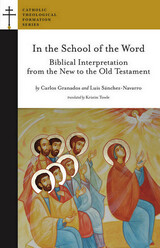
In the School of the Word
Biblical Interpretation from the New to the Old Testament
Carlos Granados
Saint Paul Seminary Press, 2021
Carlos Granados and Luis Sánchez-Navarro propose reading the Bible with Christian faith, not as one approach among many, but as a disposition demanded by the New Testament for proper interpretation of both the Old and the New. Even so, the authors’ faith never leads them to dismiss history or to discard the tools of the historical-critical method. On the contrary, these sciences allow the faithful reader to take a holistic approach to biblical truth. When the reader also takes full account of the ecclesial reality in which the Bible was formed and transmitted, and in which it must be read still today, he or she encounters the word proclaimed by the text. Indeed, the words of Holy Writ ultimately proclaim the Word (Logos), Jesus Christ, in whose Spirit they were written.
This book’s thirteen essays are grouped into three parts. Part I, “The Church, Living Subject of Sacred Scripture,” takes up a foundational theme of the whole book: sacred Scripture calls for a reading within the community of the People of God under the guidance of the Holy Spirit, and the same People constitute the living subject of Scripture. In Part II, “Christ, Exegete of the Fulfillment,” the authors focus on the relationship between the two biblical testaments. They argue that the Christian can both respect and venerate the Old Testament on its own terms, even as they find in Jesus, as presented in the New Testament and encountered in faith, the key for unlocking the Old Testament’s deepest meaning. The third and final part of this book, “The Teaching in Benedict XVI’s Verbum Domini,” examines Pope Benedict XVI’s 2010 post-synodal apostolic exhortation on the word of God in the life and mission of the Church.
The authors’ years of shared prayer, study, conversation, and ministry have led to this coauthored book bearing witness to that ongoing unity that they live as confreres. Not surprisingly, they frequently reference the same theologians, especially Brevard Childs, Paul Beauchamp, SJ, and Pope Benedict XVI.
[more]
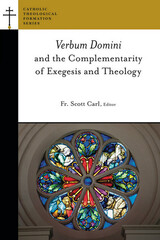
Verbum Domini and the Complementarity of Exegesis and Theology
Scott Carl
Saint Paul Seminary Press, 2021
In Verbum Domini, his 2010 apostolic exhortation, Pope Benedict XVI challenged the church to keep theology firmly rooted in the study of Scripture. The essays collected here respond thoughtfully and concretely to that charge, together demonstrating that exegesis is essential to the theological task and to faith for scholars, students, and the broader Church.
[more]

Manual de Doctrina Social de la Iglesia
Una guia para los cristianos en el mundo de hoy
Martin Schlag
Saint Paul Seminary Press, 2021
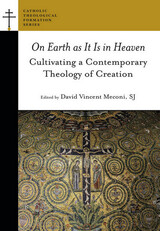
On Earth as it is in Heaven
Cultivating a Contemporary Theology of Creation
David Meconi
Saint Paul Seminary Press, 2021
With the 2015 publication of Pope Francis’s encyclical Laudato Si’, many people of faith have found themselves challenged to seek new ways of addressing serious ecological questions — issues essential to the flourishing of all creatures and not just human beings. This volume brings together fifteen select scholars to consider pressing contemporary environmental concerns through the lens of Catholic theology.
Drawing from the early church fathers and other authoritative voices in the Christian tradition, the contributors to On Earth as It Is in Heaven show how ancient, creedal Christianity offers significant insights into our current ecological dilemmas and speaks powerfully about what it means for us today to care well for God’s good creation.
[more]

Piercing the Clouds
Lectio Divina and the Preparation for Ministry
Kevin Zilverberg
Saint Paul Seminary Press, 2021
This book’s six essays pertain to the “piercing of the clouds,” or the experience of heavenly mysteries, which characterizes lectio divina practiced well. Moreover, these peer-reviewed essays give special attention to the practice of lectio divina during preparation for ministry, especially the ministry of Catholic priests. That being said, any current or prospective Bible-reader may profit from this book; most of its content applies to Catholic seminarians and literate Christians alike.
Here follow brief descriptions of each chapter. Laurence Kriegshauser, OSB, begins the book with a chapter on the Western monastic tradition of lectio divina and seminary formation, including an historical survey of lectio divina, a description of its characteristics, and reflections on its practice in seminaries. Michael Magee reflects upon the implications of exegetical method for lectio divina, with a comparison and critique of three commentaries’ treatments of John 6. Konrad Schaefer, OSB, advocates for fostering growth and formation through lectio divina, beginning his chapter with a description of its theological underpinnings and then taking up some practical considerations for students. Marcin Kowalski focuses on meditatio of lectio divina following upon exegesis-informed lectio, with an examination of Romans 7:7–25 as a test case. Daniel Keating examines oratio and contemplatio (and actio) of lectio divina, giving attention to theologians from twelfth-century Carthusian Prior Guigo II to Pope Benedict XVI. Anthony Giambrone, OP, contributes the final essay, on searching the Scriptures and the mystery of preaching. For him, exquisitio (intellectual engagement) leads to supplicatio (prayerful supplication), which culminates in praedicatio (preaching).
[more]
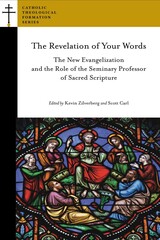
The Revelation of Your Words
The New Evangelization and the Role of the Seminary Professor of Sacred Scripture
Kevin Zilverberg
Saint Paul Seminary Press, 2021
The Revelation of Your Words, a collection of essays, treats the role of the seminary professor of sacred Scripture within the context of the New Evangelization. Some of the essays concern principally the imparting of knowledge and best practices to accomplish this; others concern the fostering of delight in the sacred page and spiritual encounter with God. Although these essays are Catholic, written within a Catholic theological framework and with Catholic seminaries in mind, many of their conclusions can be applied to non-Catholic environments. This book provides insights that, even beyond the seminary, will benefit teachers of the Bible, regardless of their denomination and level of instruction.
Readers will encounter the following authors and topics. Peter S. Williamson writes on the implications of the New Evangelization for priestly ministry and for teaching Scripture. Steven C. Smith makes a contribution concerning the role of the seminary professor of sacred Scripture in forming priests. Michael Magee treats the relevance of Johannine irony to the New Evangelization. Stephen Ryan’s chapter takes up the topic of Old Testament Wisdom literature and formation for a New Evangelization. Juana L. Manzo seeks a path to integrate modern and ancient interpretations into the seminary classroom. Kelly Anderson takes up the father of Proverbs 1–9 as a model of spiritual fatherhood for seminary professors. Scott Carl proposes a spiritual reading of sacred Scripture in the twenty-first century. Michael Magee, in his second contribution, writes on the joy of discovery in the Fourth Gospel. James Keating reflects upon the exegete as seminary formator. Finally, André Villeneuve advocates for the teaching of Biblical Hebrew in Catholic seminaries and academic institutions.
[more]

The Transcendent Mystery of God's Word
A Critical Synthesis of Antioch and Alexandria
John W. Martens
Saint Paul Seminary Press, 2024
Historical-critical methods in biblical scholarship are associated with numerous intellectual movements, such as rationalism, positivism, and historical relativism, that minimize or reject the sacred and revealed nature of Scripture. Ben F. Meyer noted, however, as have official Church documents, that modern biblical techniques are essential for locating the literal, that is, the intended sense of the biblical texts. He likened these modern methods to the ancient Antiochene school’s focus on the literal sense.
But to focus on “Antioch” alone does not account for Scripture’s theological depth, religious context, or fulfillment of the promises of God. Biblical interpretation associated with ancient “Alexandria” offers a focus on the transcendent mystery of God’s word, often lacking in current biblical scholarship, but Meyer noted that ancient allegorical interpretation cannot simply be borrowed today since it often lacks a sense of historic change and development.
This book is not about patristic reception of the Bible in Antioch and Alexandria, but the need to bring together in critical synthesis historical biblical methods that seek to understand the literal sense in all of its fullness and also incorporate methods of interpretation that take seriously the biblical texts as revelatory of God’s word for our salvation. “Antioch” and “Alexandria” are representative in this book of interpretive stances that pay attention to historical context, change, and development and are open to transcendence in order to offer the salvific power of Scripture to readers in our own day.
[more]

Walking with Jesus Christ
Catholic and Evangelical Visions of the Moral Life
Steven Hoskins
Saint Paul Seminary Press, 2023
Walking with Jesus Christ: Catholic and Evangelical Visions of the Moral Life is the collected essays and consensus statements of the second round of the National Evangelical-Catholic Dialogue. In 2021 the National Evangelical-Catholic Dialogue completed its four-year round of discussion on the moral life, at the University of St. Thomas in St. Paul, MN. Sessions were held each year on the following topics. In 2017, the dialogue discussed the norms governing the moral life. In 2018, the dialogue discussed sexual ethics. In 2019, the dialogue discussed social ethics. Finally, in 2021 the dialogue discussed the relationship of the moral life to eschatology. At each of the annual meetings, members presented background papers that formed the basis of that meeting’s discussion and became starting points for constructing a common statement. These common statements and background papers make up this book. The members of the dialogue hope this book will provide a fruitful starting point for future conversations between evangelicals and Catholics.
The Catholic essays begin with the contributions of Catholic theologians Daniel Keating, William Stevenson and Christian Washburn, who examine the various norms for Catholic moral theology including the role of Scripture, tradition, magisterium, and natural law (2017). David Fleischacker, Daniel Keating, and Christian Washburn examine the morality of marriage, contraception, abortion, and homosexual acts (2018). Daniel Keating and William Stevenson discuss social ethics, including Catholic social teaching and socialism (2019). David Fleischacker and Christian Washburn discuss the relationship of the moral life to our final beatific end (2020).
The Evangelical essays begin with the contribution of Evangelical theologians Bruce Cromwell and Dennis Jowers who explore the norms of Protestant Ethics (2017). David Van Drunen and Luke Geraty discuss sexual ethics from different ends of the Evangelical perspective (2018). Glen Menzies and Steve Hoskins evaluate approaches to evangelical social ethics from Pentecostal and Wesleyan points of view (2019). Bruce Cromwell and Steve Hoskins discuss the notions of eschatology and ethics from a Wesleyan viewpoint (2020).
[more]
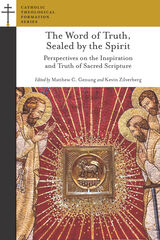
The Word of Truth, Sealed by the Spirit
Perspectives on the Inspiration and Truth of Sacred Scripture
Matthew C. Genung
Saint Paul Seminary Press, 2022
The Word of Truth, Sealed by the Spirit is a collection of seven essays pertaining to the topic of biblical inspiration and truth. Two chapters provide a critical analysis of the Pontifical Biblical Commission’s 2014 document The Inspiration and Truth of Sacred Scripture and reflect upon its relevance and outcome. Five chapters respond to a particular aspect of this document by investigating a hermeneutical or exegetical question in order to advance the dialogue on the questions of biblical inspiration and truth. This book is intended not only for Catholic seminary and university professors and students but also Protestant scholars and students, as well as catechized lay people of all Christian denominations.
Luis Sánchez-Navarro, DCJM, writes on the importance of understanding the relationship between revelation, biblical inspiration, and truth for both biblical interpretation and for Christian living. Michael Magee provides a critical analysis of the PBC document by situating it within the recent history of the Church’s attempts to clarify the theology of biblical inspiration and truth. Matthew C. Genung studies Exodus 19 in its context, showing that the Bible itself indicates that its nature as emended Scripture pertains to its inspired character. Anthony Pagliarini writes about the Book of Ezekiel as inspired Scripture given the non-fulfillment of Ezekiel’s prophetic vision of the restored Temple. Aaron Pidel, SJ, analyzes Joseph Ratzinger’s writings on hermeneutics and biblical theology, to propose a reliable methodology for determining the historicity of conflicting biblical reports. Marcin Kowalski, analyzing 1 Corinthians 11:2–16, addresses the question of the inspired character of a text at variance with changing gender roles in society. Kelly Anderson evaluates biblical texts depicting an inner-trinitarian dialogue in order to shed light on the relationship of inspired Scripture to the eternal dialogue of God.
[more]

Worthy Lamb
An Exegetical-Spiritual Commentary on John's Apocalypse
Andreas Hoeck
Saint Paul Seminary Press, 2024
This book is a systematic commentary on the Apocalypse of Saint John, examining each chapter and verse based on the original Greek and Latin texts. The underlying hermeneutic is an idealist or allegorical point of view that does not attempt to identify apocalyptic imagery with concrete historical events. Rather, symbols and metaphors are interpreted, with attention to their intertextuality, as paradigmatic of the epic battle between the forces of light and darkness, good and evil, the dragon and the Lamb, playing out not only in the vicissitudes of the world today, but also and especially in one’s personal life. Rather than focusing on sterile symbolisms, the book attempts to inspire a more radical discipleship of Jesus by applying the eschatological imagery to the realm of spiritual discernment. John’s Apocalypse is certainly considered the grand New Testament Theology of History, but here its ethical dualism is mainly taken as a challenge for the interior life, to enter into the worship before the throne of Christ the Lamb, and to realize that where evil makes war against the principles of good, God will remain in control at all times.
The author has drawn on two commentators whose work has not been translated and made widely accessible until now, Rupert of Deutz and Adrienne von Speyr. The book aims to relay Revelation’s message of Christ-centered faithfulness and perseverance, of virtue and holiness, once addressed to the seven churches in Asia, to a contemporary readership.
[more]
READERS
Browse our collection.
PUBLISHERS
See BiblioVault's publisher services.
STUDENT SERVICES
Files for college accessibility offices.
UChicago Accessibility Resources
home | accessibility | search | about | contact us
BiblioVault ® 2001 - 2024
The University of Chicago Press









